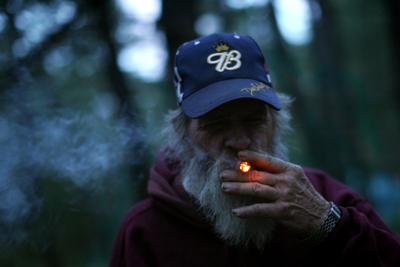
(RNS6-MAY12) Norman Cornelius is one of the oldest and longest residents of a tent city in Lakewood, N.J. For use with RNS-SQUATTER-CAMP, transmitted May 12, 2009. Religion News Service photo by Aristide Economopoulos/The Star-Ledger.
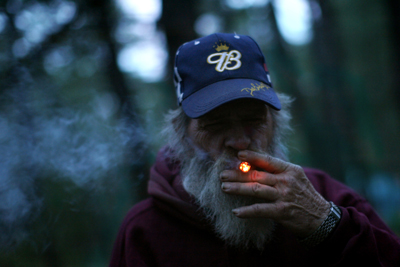
(RNS6-MAY12) Norman Cornelius is one of the oldest and longest residents of a tent city in Lakewood, N.J. For use with RNS-SQUATTER-CAMP, transmitted May 12, 2009. Religion News Service photo by Aristide Economopoulos/The Star-Ledger.
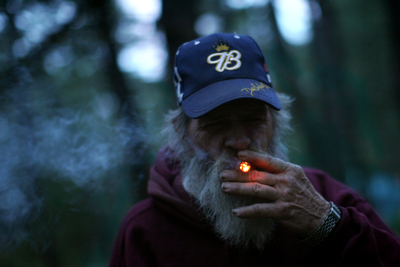
(RNS6-MAY12) Norman Cornelius is one of the oldest and longest residents of a tent city in Lakewood, N.J. For use with RNS-SQUATTER-CAMP, transmitted May 12, 2009. Religion News Service photo by Aristide Economopoulos/The Star-Ledger.
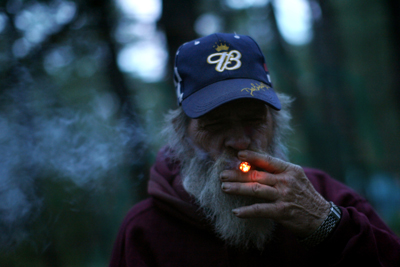
(RNS6-MAY12) Norman Cornelius is one of the oldest and longest residents of a tent city in Lakewood, N.J. For use with RNS-SQUATTER-CAMP, transmitted May 12, 2009. Religion News Service photo by Aristide Economopoulos/The Star-Ledger.
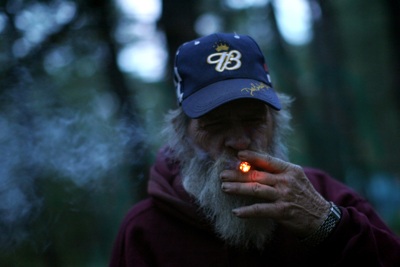
(RNS6-MAY12) Norman Cornelius is one of the oldest and longest residents of a tent city in Lakewood, N.J. For use with RNS-SQUATTER-CAMP, transmitted May 12, 2009. Religion News Service photo by Aristide Economopoulos/The Star-Ledger.
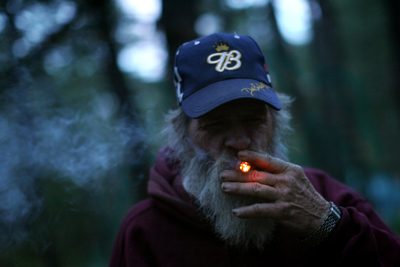
(RNS6-MAY12) Norman Cornelius is one of the oldest and longest residents of a tent city in Lakewood, N.J. For use with RNS-SQUATTER-CAMP, transmitted May 12, 2009. Religion News Service photo by Aristide Economopoulos/The Star-Ledger.
LAKEWOOD, N.J. — The vegetable garden is ready to plant, the washer and dryer will be hooked up soon, and Nina the Polish lady figured out how to make cheese from the milk of the new goat, named Molly.
But while residents of what has come to be known as “KP Tent City” search for 20 more chickens “so we have enough eggs to be self-sustaining,” local officials explore ways to “gently” roust what Mayor Robert Singer calls “a nightmare waiting to happen.”
Throughout the country, tent cities have risen in response to troubled economic times and, just as quickly, have been shut down for health and zoning violations. Even the tent camp in Sacramento, Calif., made a national symbol of the recession by Oprah, pulled up stakes last month.
Here in Lakewood, however, the tent city is now in its second year and becoming more entrenched every day.
The squatters — most chronically homeless — sank a well, rigged up a propane-heated shower and built a food shed. There is a bathroom tent with a chemical toilet on a wooden platform. There are movies they can watch on a donated television powered by a donated generator.
About 25 tents, a half-dozen teepees and a pop-up camper sit on a few acres of pine forest on the edge of town. The tents are decorated with found art: a piece of mirror, fake flowers from a dump pile, carvings from scrap wood, an animal skull, an American flag.
“People are worrying about $400,000 homes and $80,000 cars and they’re just a couple of paychecks away from us,” said “Bootleg Jimmy” Dorsey, 65, whose nickname relates to his drinking habits.
“I feel sorry for them. At least we’re used to being poor.”
Like Bootleg Jimmy, many of the 20 to 30 residents at KP had been on the road most of their adult lives.
There is a communal vibe at KP even though many campers have a long history of addiction or behavioral problems. The homeless all appear to be clean, and the air smells sweet. It is surprisingly quiet.
“Our goal is to be self-sufficient, responsible and a community,” said Steven Brigham, 48, a nondenominational minister who is the driving force behind KP Tent City. “We are also a reminder. We wouldn’t be here if there were better alternatives for the homeless.”
“Minister Steve,” as everyone calls him, sees himself as a “catalyst for change.” The mayor, meanwhile, calls him an enabler.
“People feel good when they donate stuff to the tent city, but sitting out in our woods is not going to make the lives of these people any better,” said Singer, who has been in Lakewood government for 28 years.
“There is housing for these people, but they need to obey rules, like no drinking, and they don’t want to obey rules,” Singer said. “So don’t tell me I’m the bad guy because I want people out of the woods before something bad happens.”
Bad things did happen at other encampments in and around Lakewood in recent years. There were fights and homeless-bashing. Exploding stoves severely burned one man last year and killed another in February.
Local outreach workers estimate 15 homeless people have died in Lakewood in the past eight years, most from exposure. The only death at KP was from a brain aneurysm, Brigham said.
The squatters clean up after themselves. It’s one of Minister Steve’s rules. Some tent interiors are neat, others almost pathologically messy. Health authorities worry about disease and the lack of refrigeration. The campers say their diet — primarily donated food — is a huge step up from Dumpster diving.
“Nobody got sick yet,” said “Stormy Norman” Cornelius, 67.
From the beginning, KP — named after the Kennedy projects, an apartment complex across the street — was different. The difference was Brigham.
A former heavy-equipment operator who was ordained a decade ago and works with the Lakewood Outreach Ministry Church, Brigham drew on his boyhood camping in Michigan to set up camp. Last fall, he moved into one of the teepees.
The tent city operates on donated food, clothes, tents, furniture, equipment and about $20,000 a year in donated cash, he said.
Brigham holds Sunday services on the grounds but does not require attendance. He talks about Jesus “as the original homeless guy,” but draws equally on Thoreau-like principles of self-reliance and civil disobedience.
No one questions Brigham’s sincerity, only his refusal to work within the system. He also admits he likes “the attention this place generates, because it gives me a voice for the homeless.”
(BEGIN FIRST OPTIONAL TRIM)
One Brigham refrain that has caused tension with Lakewood officials is the minister’s claim that low-income housing in the township “is segregated — not by race but by religion. It isn’t anti-black. It is anti-Christian, anti-Muslim and anti-Hindu.”
He is referring to federally subsidized low-income housing, some of which was recently built in neighborhoods adjacent to the tent city. Much of the housing is occupied by Orthodox Jews, many of them students at a prestigious Haredi yeshiva in town. Many of the Talmud scholars live below the poverty line.
Activists representing blacks and Hispanics, who make up much of the rest of the local poor, admit that the Orthodox earned the right to be first into subsidized housing because they applied first, followed through on the paperwork first and got on the waiting lists first.
Social workers also note that most of the homeless at KP would not qualify for federally subsidized housing. They have histories of drug- or alcohol-related crime and have in the past refused to contribute toward the cost of rent.
(END FIRST OPTIONAL TRIM)
Brigham has only a few rules: People must get along, do their share, respect the camp. What he does not do — and takes heavy criticism for — is insist on sobriety.
“One of the reasons these people were living out of junk cars to begin with is that they don’t want to be clean and sober,” Brigham said. “Our rules are: No drugs in camp, and don’t drink to the point of being a nuisance. Beyond that, I’m not telling them what to do.”
Some of the squatters freely admit that living virtually for free at the camp offers the luxury of spending their limited funds on items such as beer.
Brigham’s response: “Maybe if we can give them self-respect and dignity, they won’t need to drink so much.”
Singer’s response: “If you want to help an addict, get him in a program.”
Many of the squatters receive public assistance: Social Security, disability or welfare. They are expected to contribute toward food — canned goods supplemented by meat — and help with the daily chores “the best they can,” Brigham said.
“Some people can’t either physically or mentally do much, but they can rake or clean up or feed the chickens,” Brigham said. “The point is, not only do we share the space, but everybody needs a small sense of accomplishment.”
(SECOND OPTIONAL TRIM FOLLOWS)
According to Michael Stoops, executive director of the National Coalition for the Homeless, nearly half of the nation’s homeless are unsheltered, and tent cities “are often antidotes to shelters that treat people like children.”
Brigham admits KP probably will not go away until it’s plowed under. At that point, the most likely option for the squatters is a free bus ticket to Atlantic City or Camden, where there are homeless shelters.
Singer said Lakewood officials “want to do the right thing” but are running out of patience.
“We will offer them help,” the mayor said, “but if they don’t take it, we will go to court. I will not have another winter with Tent City in my woods.”
(Judy Peet writes for The Star Ledger in Newark, N.J.)




